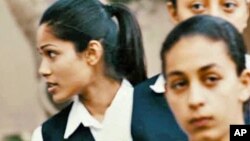Miral, a new film by acclaimed director Julian Schnabel, is based on a book by Palestinian author Rula Jebreal. It chronicles the lives of four Palestinian women - from 1948 when the state of Israel was created to the 1990s. Through the four women, and especially Miral, the youngest, the film tells the story of the ongoing Israeli - Palestinian conflict. Director Julian Schnabel, a Jewish American, looks at that conflict through Palestinian eyes and that has sparked controversy among Jews in America.
"We have children from every corner of Palestine," said Hind al-Husseini. "And every day there’s more. My goal is to educate these kids. And give them hope."
Hind al-Husseini is an upper class Palestinian. In 1948, she establishes a school in Jerusalem to shelter Palestinian girls whose parents have been killed in the conflict raging across the land. Hind is one of the four women showcased in this story.
"Miral! How nice to see you," she said. "Don’t worry about her. She’ll be fine."
Miral is the most prominent of the four. She grows up in the school in the eighties and early nineties during the first Palestinian uprising in the Israeli-occupied West Bank.
Hind: "You might have heard that there is an uprising, what has been called the Intifada."
Miral: "It means stand up straight."
Miral joins the revolt and is arrested by Israeli police.
Police to Miral’s father: "Miral Shahin. Does she live here?"
Her father: "She is my daughter. There must be some mistake."
Police: "Call her please."
Father: "She is asleep. It’s very late."
Police: "Stay down. Stay down."
Father: "I don’t understand."
Miral: "I am Miral Shahin."
Miral is taken away and tortured.
The story is based on a semi-autobiographical novel by Rula Jebreal, who also wrote the screenplay. She says Miral is an accurate account of Israeli oppression of the Palestinians since 1948.
"It’s not that it happened and it’s over," said Rula Jebreal. "It’s still happening till today. Miral is not me anymore because I left and I built a life. But it’s the many girls that are still there. They are still going through the same violence, the same oppression, the same racism and if I had a moment of hope, it was the peace agreement [in 1993.] That hope was killed, broken."
Israel's government has not commented on the movie but it opposed the decision to hold the premiere at the United Nations General Assembly.
So did the American Jewish Committee, a major pro-Israel group.
Kenneth Bandler, Communications Director at the AJC, told VOA that the film is one-sided but that's not the major objection.
"It’s one - sided which Julian Schnabel himself acknowledges it is a one-sided film," said Kenneth Bandler. "But again our objection was to its being screened at the General Assembly at the United Nations. We are not in the business of censoring films, and we’ve not spoken about it being shown in American theaters."
Julian Schnabel, the artist and award winning movie director who made the film, said the criticism is not his concern.
Sitting in a director’s chair at the Voice of America, in his signature pajamas, he explained why.
"I understood at the beginning of this process that it would engender this kind of reaction because there’s never been a movie made in the United States by certainly an American Jewish director about a Palestinian girl and her point of view," said Julian Schnabel.
"Obviously there's a dialogue that needs to take place between the Jewish community in the United States and also in Israel because we need to solve this problem."
Schnabel says although the film has sparked controversy among Jewish Americans, Palestinians and Israelis share a common fear.
"And that is, none of them are sure their kids are gonna come home from school at the end of the day, whether there is a terrorist that is going to blow some people up or whether it’s a straight bullet that’s gonna hit a kid from a scared soldier in the occupied territories," he said.
The characters that inhabit the story point to a diverse and complex Palestinian society. There are pacifists, militants, upright people and corrupt ones.
"We'll accept 22 percent of the land," said a Palestinian. "It's more than what we have now. We can't go on waiting forever."
The movie ends with the 1993 Oslo Accords that created a path to a Palestinian state.
In the film, Hind al Husseini, the founder of the school, tells Miral that she never thought she would see a Palestinian state. She didn’t.
Schnabel says the ongoing conflict makes his film all the more relevant.
"We need to understand ‘the other.’ And that’s the reason I made the movie about ‘the other’ from ‘the other’s’ point of view," said Schnabel.
Peering through his glasses, he talks about how people in Egypt and Tunisia stood up peacefully for change. He hopes his film sparks a dialogue that helps bring peaceful co-existence between Palestinians and Israelis.














